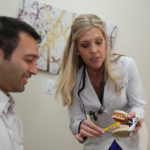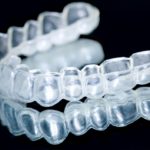Doesn’t everyone want a whiter smile? Just watch the Oscars and see all the bright white mouths filled with perfect blinding, bright white teeth. Now look at the whites of their eyes. Do they look yellow? Often times the answer is yes and this is because teeth can be over-whitened to cause a jaundice-like look to the face through the eyes. Making the teeth too white makes the whites of our eye look yellow and this is something to avoid.
We highly recommend a good brightening every once in a while but no need to overdo it!
Our best recommendation is at-home whitening where you can control as little or as much of the treatment as you would like. If you want a Hollywood smile, go for it. This involves one impressions appointment where custom-whitening trays will be made for you to take home and a one-month supply of whitening gel is provided. We recommend brushing, flossing, and then whitening every day for 1 hour with the high strength or overnight with our lower strength gel. This is done every day for two weeks, and then touch ups for one hour once a month or whenever you remember for a little brighter smile.
Tooth whitening can make your teeth extremely sensitive. We recommend 2-3 three days of whitening with the lower strength gel as above, but then do a 4th day treatment with one hour of fluoride gel in the trays rather than the whitening gel. This helps to neutralize the reaction and decrease sensitivity. It will also prolong treatment and take about 3 weeks instead.
During whitening it is also advised to avoid drinking coffee, red wine or other dark liquids as teeth are more porous and susceptible to staining. If you are like most of us in the office and cannot or will not give up coffee, drink it through a straw to help keep the liquid off the front teeth. Whitening also decreases the ability of our dental materials to bond to the teeth. If you are whitening your teeth, we ask for a one-week break prior to receiving dental treatment to increase the strength and success of your new fillings, bondings or crowns.







